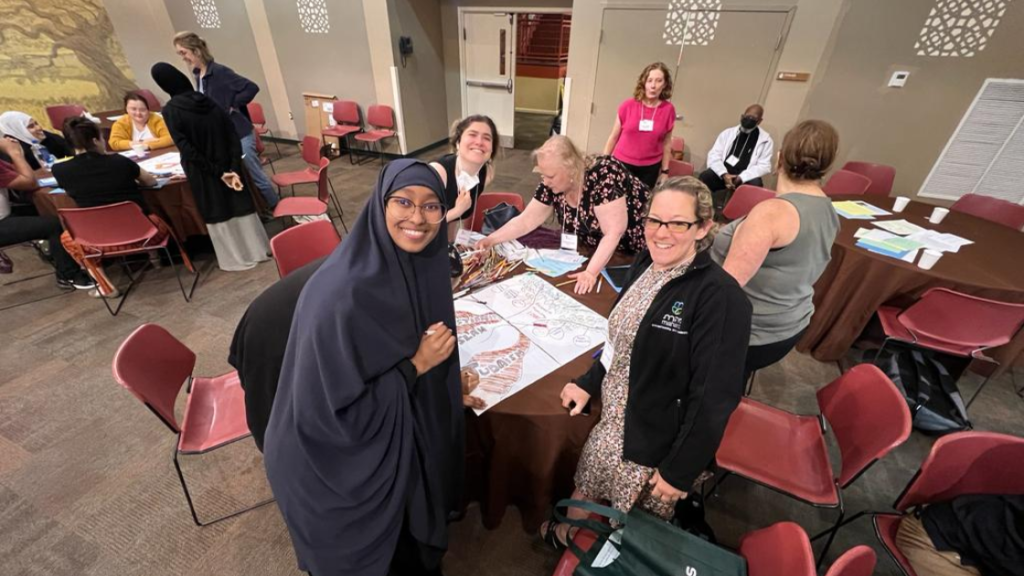Last week I had the opportunity to join an interfaith dialogue organized by the Institute for Islamic, Christian, and Jewish Studies. Bringing together ten students from each faith tradition, the ICJS held a 4-day intensive course called Emerging Religious Leaders. The course allowed students who are training to be religious leaders to learn about each other’s faiths, ask questions, find similarities and differences in their belief systems, and share their experiences as people of faith in today’s world.
Through this immersive, interactive experience, the mission of the ICJS was truly brought to life: “to dismantle religious bias and bigotry, ICJS builds learning communities where religious difference becomes a powerful force for good.” Students from the 3 Abrahamic faith traditions were able to meet and engage in interfaith dialogue together, many for the first time. As they individually are working to become leaders in their own communities, through this course they were also exposed to people of other faiths on a similar path of becoming a religious leader. I found it to be an important learning tool for our future leaders to practice how to conduct conversations and discuss our differences, and how we can celebrate our similarities.
As religious communities living in a secular world, too often we live in silos, and are not communicating with our neighbors. And yet we all live with the mission of guiding and supporting people and making the world a better place. As long as we live in a pluralistic society and choose to live among neighbors, classmates, and communities that are not Muslim, we need to acknowledge this and see how we can work together. It is not enough to live in our own worlds, worship alone, and live a life of faith alone. I found great allies among the students and teachers there, people who are intent upon uplifting women, supporting people of faith, and working together to make the world a better place.
As part of the experience, we prayed in congregation and shared our ritual worship services. We were able to observe a Jewish shabbat service, and was pleased to find that phrases in their prayer book were very similar to verses from the Quran. I saw a truly monotheistic faith that worships the same God that Muslims do. We were also able to attend a Christian service and hear their joyous proclamation of faith and fervent prayers for every member of the community. It was heartwarming to see the genuine care in their prayers and enthusiasm in sharing their faith. As Muslims, we were able to pray Maghrib prayer, and have our counterparts observe, share reflections, and ask questions about our prayer. I hope with this sharing that there will be more understanding between worshippers of different faiths, and that minorities in North America will feel more comfortable worshipping in public and sharing their traditions with each other.
Inevitably, the event did not end without some turbulence. Different perspectives were shared, and emotions ran high – we know they will with people who truly believe fervently. However, as people of faith I was proud to see the students overcome their differences and still able to come out with positive relationships and opportunities for future collaborations. They truly embodied the verse,
يَـٰٓأَيُّهَاٱلنَّاسُ إِنَّا خَلَقْنَـٰكُم مِّن ذَكَرٍۢ وَأُنثَىٰ وَجَعَلْنَـٰكُمْ شُعُوبًۭاوَقَبَآئِلَلِتَعَارَفُوٓا۟ ۚ إِنَّ أَكْرَمَكُمْ عِندَ ٱللَّهِأَتْقَىٰكُمْ ۚ إِنَّ ٱللَّهَ عَلِيمٌ خَبِيرٌۭ
“O humankind, indeed We have created you from male and female and made you peoples and tribes that you may know one another. Indeed, the most noble of you in the sight of Allah is the most mindful of Him. Indeed, Allah is Knowing and Aware.” (al-Hujurat, 13)
I learned many lessons from my fellow faculty and the students in attendance: the wisdom of sitting back and hearing the perspective of others, and the self-control that that takes; the compassion of a leader who feels the room, changes the schedule as needed and steers the conversation back to a positive space; an enigmatic speaker and presenter who draws audiences in with his words; a reserved introvert who was willing to step out of her world and engage in new experiences. We have much to learn from our neighbors, and we can take lessons from the example of the Prophet (s) in living alongside peoples of other faiths in peace and positivity. I hope to continue interfaith endeavors myself and also encourage students and teachers alike to seek out opportunities to participate in interfaith work.
EamaanRabbat
Education Director
Rabata



